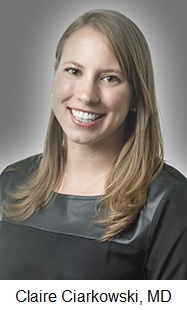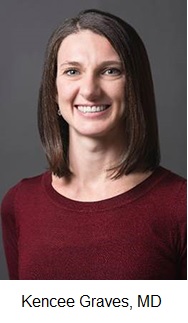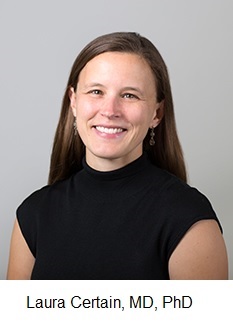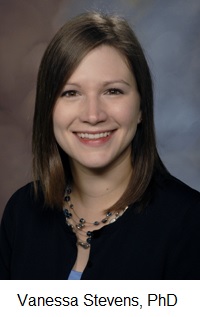AAMC Seminar Develops Leadership Skills for Early-Career Women Faculty
The medical career of Dr. Claire Ciarkowski, MD, an assistant professor of medicine in the Division of General Internal Medicine, began with a skeleton in a living room.
 As the daughter to a practicing family physician and a biomedical engineer, she grew up surrounded by medical teaching devices that made her accustomed to the often morbid world of medicine. She credits the artificial skeleton, fondly named Yorick after the infamous skull in Shakespeare’s Hamlet, and the open heart procedure she observed in high school, as the moments she knew she was destined to be a physician.
As the daughter to a practicing family physician and a biomedical engineer, she grew up surrounded by medical teaching devices that made her accustomed to the often morbid world of medicine. She credits the artificial skeleton, fondly named Yorick after the infamous skull in Shakespeare’s Hamlet, and the open heart procedure she observed in high school, as the moments she knew she was destined to be a physician.
What’s less clear is the moment she knew the crucial role she’d have as a woman physician leader. For many women physicians in leadership roles, further training is often required to combat the unique experiences that male colleagues do not encounter.
Despite serving as Medical Director for Patient Experience, and her involvement in numerous successful quality improvement projects, Dr. Ciarkowski admits that assumptions are often made about her simply because she is a woman.
“Patients feel more comfortable asking me personal information, like if I have children. They often assume that I am a nurse instead of their attending physician and feel comfortable addressing me by my first name or calling me “sweetheart” rather than Dr. Ciarkowski. Sometimes they comment on what I’m wearing,” she recalls. Her male colleagues, she notes, don’t seem to experience this phenomenon over the course of their careers.
To combat the challenges faced by women faculty in leadership roles, the Association of American Medical Colleges (AAMC) has developed the Early Career Women Faculty Leadership Development Seminar. This three and a half-day seminar is designed for women physicians and scientists in the early stages of their leadership careers, and aims to present a foundation of leadership skills such as improving communication, navigating gender dynamics in the workplace, strategic planning, and more.
Acceptance to the seminar is highly competitive, but with her established leadership roles and a passionate application, Dr. Ciarkowski was accepted to attend the second seminar of this year from July 27-30, 2019.
For the first-time ever, the AAMC offered two sessions of the Early Career Women Faculty Leadership Development Seminar in order to support the greatest number of women faculty possible. The first session of the seminar this year, held in February, was attended by two talented Internal Medicine women faculty members: Drs. Kencee Graves, MD, and Laura Certain, MD, PhD.
Dr. Graves, an assistant professor of medicine in the Division of General Internal Medicine and an Associate Chief Quality Medical Officer, sees the two seminars as a means for women faculty to “catch up” to their male peers’ opportunities to lead.
“I feel like most women physicians didn’t see ourselves as leaders for a long time," she says, “but with more women being accepted into medical school than ever before, we are finally starting to see a better overall representation of women physicians. It makes sense that AAMC has offered two sessions this year; with more overall women physicians, the more women physician leaders that have emerged needing guidance on how to further their careers and their leadership skills.”
Identifying skills in need of improvement is one of the major program objectives of the Early Career Women Faculty Leadership Development Seminar. Dr. Certain, an assistant professor of medicine in the Division of Infectious Diseases and section chief of Infectious Diseases at the George E. Wahlen Veterans Affairs Medical Center (VAMC), found herself immersed in courses at the February seminar that helped with practical leadership skills as well as “big picture” skills.
“I enjoyed the time and email management sessions, and the public speaking session showed me I have areas I could definitely improve,” Certain says. “As far as big picture skills – I truly enjoyed the sessions that gave me protected time to just stop and think: What is important to me? What are the next steps in my career? As a practicing physician, I’m often too busy to have these moments of clarity and future planning, so I’m thankful I had the opportunity to do so at this seminar.”
Networking is another important aspect of the seminar. “Walking into the February seminar on the first day was overwhelming in the best possible way,” Graves recalls. “I saw hundreds of women in high-level leadership positions, and I realized that I am not alone. It was wonderful to meet people from all over the country who are trying to do exactly what I’m trying to do which is further my career as physician and leader.”

Dr. Certain also met her fair share of new colleagues, even those from within the University of Utah. “I met up with Dr. Graves, and another U of U colleague from pediatrics while at the February seminar,” she says. “Even though we are all back in Utah, the three of us continue to meet up once a month to practice the skills we learned. We give each other advice or just take the protected time to work on projects.”
This monthly meeting stresses another aspect of the seminar: the importance of continued woman-to-woman mentorship. “Women have a different way of leading,” says Graves. “We pull each other up, collaborate, and try to make it work for everyone. This seminar showed me women shouldn’t try to lead like men; leadership works best when you are your true, authentic self. Be who you are, and own the skills you have.”
Drs. Ciarkowski, Graves and Certain are practicing clinicians, but the AAMC seminar is equally valuable to early-career investigators. Dr. Vanessa Stevens, an assistant professor in the Division of Epidemiology, was interested in the seminar but wasn’t sure if the courses would apply to her since she is not a clinician. With encouragement from her division chief, Dr. Matthew Samore, Dr. Stevens applied and was accepted to the seminar in July 2018.
Managing a team of eight data-scientists at the VAMC, she realized there were some definite gaps in her leadership skills. “They don’t teach you how to be a leader when you get your PhD,” she says, “but thankfully the courses at the AAMC seminar applied broadly to many positions, even research faculty. Courses like the art of negotiation, preparing for a promotion, and time management are skills that apply to both clinicians and non-clinicians.”
Since attending the seminar last year, Dr. Stevens has already encouraged colleagues to apply. “It was overall an incredible experience. It’s so inspiring to hear deans, department chairs and other women in high-level leadership positions discuss successes and challenges from personal experience. I would strongly recommend every woman in academic medicine – whether you are a clinician or researcher – to attend this seminar.” 
With the July session of the Early Career Women Faculty Leadership Development Seminar quickly approaching, Dr. Ciarkowski reflects on why women leaders are so important, especially in the field of medicine. “We bring a different perspective, and our voices are so valuable. The medical community is just beginning to realize this,” she says. “Women aren’t just cute doctors, but capable physician leaders with knowledge, ambition, and intelligence. We have voices that can make a difference.”
Though applications for the July 2019 session are now closed, the Department of Internal Medicine encourages early-career women faculty to consider applying for the Early Career Women Faculty Leadership Development Seminar at the next session in July 2020. Applications open mid-February 2020. More information about the seminar can be found on the AAMC website.
For application assistance or questions, please contact Dr. Michael Rubin, Vice Chair of Faculty Affairs and Development at michael.rubin@hsc.utah.edu.